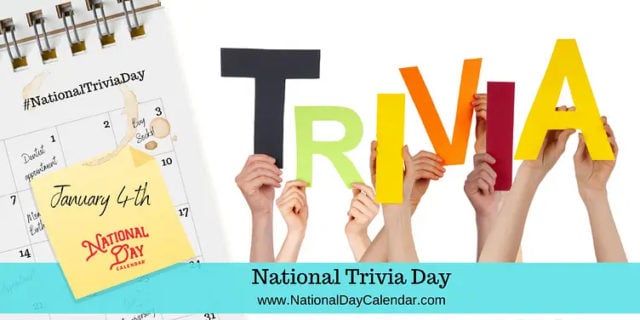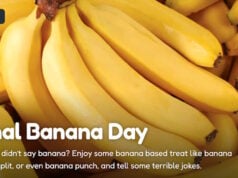
What National Day on January 4th celebrates those who accumulate and hoard tidbits of useless trivia? National Trivia Day, of course!
Each year, the holiday recognizes the collectors of unconnected, irrelevant data, facts, history, and quotes in the recesses of their brains. They are the ones who usually proffer these sometimes astounding bits of history when friends and family least expect it.
- The word trivia is plural for the word trivium.
- In ancient times, the term “trivia” was appropriated to mean something very new.
- Nostalgic college students in the 1960s, along with others, began to informally trade questions and answers about the popular culture of their youth.
- Trivia (Dell, 1966) was the first book treating trivia in the revolutionary new sense, authored by Ed Goodgold and Dan Carlinsky. This book achieved a ranking on the New York Times bestseller list.
- Over time, the word “trivia” has come to refer to obscure and arcane bits of dry knowledge as well as nostalgic remembrances of pop culture.
- In North America, the game Trivial Pursuit peaked in 1984, when consumers bought over 20 million games.
- Trivial Pursuit was first created in Montreal, Quebec, Canada in 1979 by two men named Chris Haney and Scott Abbott, who had become frustrated to find pieces of their Scrabble game had gone missing, thus inspiring them to create their own game. Trivial Pursuit became an almost instant hit and worldwide phenomenon, and the trivia craze began.
- Steven Point, Wisconsin, holds the largest current trivia contest at the University of Wisconsin-Stevens Point’s college radio station WWSP 89.9 FM. During the April 2013 event, the university hosted the 44th annual contest. Typically, 400 teams participate, ranging from 1 to 150 players. The competition, which is open to anyone, spans 54 hours over a weekend with eight questions each hour.
- The first season of the popular television trivia show Jeopardy! premiered on March 30, 1964.
- In the Victorian era, special teacups were produced to protect the mustache from being inadvertently dipped in tea.
- Hallmark now produces cards for those who have been made redundant.
- Dr. Dre has made more money from the “Beats” headphones franchise than he made over his entire musical career.
- Cuba is the only Caribbean Island with a railway
- Several building in New York have their own zip code
- Spain means “the land of rabbits”
- Rome was the first city to reach a million people
- The entire population of the Earth would fit in Texas
- Fredric Baur invented the Pringles can, and when he died in 2008, his ashes were buried in one
- Captain Morgan rum was named after a Welsh pirate who later became the lieutenant governor of Jamaica
- The word “muscle” comes from a Latin term meaning “little mouse.”
- Tic Tac mints are named after the sound their container makes.
- The largest volcano in the solar system is three times taller than Mount Everest.
- An 11-year-old is responsible for naming Pluto. In 1930, the Royal Astronomical Society (RAS) was struggling to come up with a name for a newly-discovered planet. They considered Minerva, Zeus, Atlas, and Persephone—but it was 11-year-old Venetia Burney Phair who suggested Pluto, inspired by the god of the underworld. When the idea eventually reached RAS with the help of the girl’s connected family—her librarian grandfather knew many astronomers—they loved it and ultimately decided to use the suggestion.
- There’s a Russian village where every resident is a tightrope walker. In Tsovkra-1—a small, secluded village in the southern republic of Dagestan—everyone who’s physically able can walk on a tightrope in a tradition that’s existed for more than 100 years.
- Benjamin Franklin was inducted into the International Swimming Hall of Fame.
- Your dog knows when someone isn’t trustworthy.
- The majority of polar bears live in Canada—not in the Arctic.
- The smallest unit of measurement in the universe is the Planck length. It’s the smallest possible size of anything in the known universe at a mere 1.6 x10-35 meter across, which is the equivalent of around a millionth of a billionth of a billionth of a billionth of a centimeter (or a decimal point followed by 34 zeroes and a one).
- The first breakfast cereal had to be soaked overnight before it could be eaten.
- The world’s largest Barbie collection includes more than 15,000 dolls.
- The longest tennis rally lasted over 12 hours. Italian athletes Simone Frediani and Daniele Pecci earned the world record for the longest tennis rally ever on June 11, 2017.
- The first pieces of gold at Fort Knox arrived by mail.
- Arkansas hosts the annual World Championship Duck Calling Contest.
- The first TV commercial didn’t air until the 1940s. On July 1, 1941, the L.A. Dodgers were playing the Philadelphia Phillies in New York at Ebbets Field. And while the game was surely exciting on its own, those who were watching at home on the NBC-owned WNBT—now WNBC—also saw another exciting historical moment: the very first TV commercial shown in the United States.
- The stars and flashes of light you see when you rub your eyes are called “phosphenes.”
- Pittsburgh is the only city where all three major sports teams share the same colors.
- England is hit with more tornadoes per square mile than any other country in the world.
- The space between your eyebrows is called the glabella.
- The horse on the Wyoming license plate is named Steamboat.
- When a piece of bread is toasted, it’s called the “Maillard reaction.”
- Dogs can learn up to 165 words.
- There is a museum of bad art. Located in Somerville, Massachusetts, the Museum of Bad Art (MOBA) houses a permanent collection of more than 700 pieces
- There are 293 ways to make change for $1.
- The 100 folds in a chef’s hat represent 100 ways to cook an egg.
- Four times more people speak English as a second language than as a native one.
- The speed of a computer mouse is measured in “Mickeys.” Technically, a “mickey” is 1/200th of an inch. A British scientist first invented the roller-ball device in 1946 while working for the Royal Navy, but the word “mouse” didn’t get coined until 1965.
- You can major in wine at Cornell University.
- A $1 bill costs 5 cents to make.
- The Spotify track with the most streams in a day is 24 years old.
- If Facebook was a country, it would have 1 billion more people than China.
- The shortest sentence in English is “Go.”
- A “jiffy” is a real unit of time. In the physics world, a “jiffy” is the time it takes light to travel a centimeter in a vacuum or around 33.4 picoseconds.
- Sleeping burns more calories than watching TV.
- “Forty” is the only number (in English) whose letters are in alphabetical order.
- Central Park’s lampposts have numbers on them specific to their location. Lampposts in Central Park have numbers on them to help you keep track of where you are. If you’re lost in the massive park, take a look at the nearest lamppost. There will be four numbers on it. The first two are the digits of the nearest numbered street, and the second two reveal whether you’re on the east or west side of the park. Odd numbers reveal that you’re on the west side of the park; even numbers signify east. The numbers have been there as long as the lampposts themselves—since the 19th century.
- You can start a fire with Doritos.
- Only two body parts never stop growing. Your nose and your ears.
- The “stomach-gurgle” has a scientific name. The technical name for the noise your stomach makes when it growls is a “borborygmus.”
- If you store sour cream or cottage cheese upside down, it’ll last longer.
- The hashtag symbol is technically called an octothorpe.
Sources:












